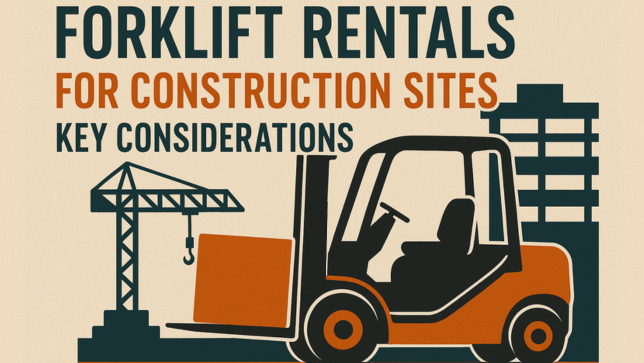Whether you’re managing a large-scale construction project or running a small contracting business, having the right equipment is crucial. A construction forklift rental can provide the robust, versatile machines you need without the high upfront costs of ownership.
From telehandlers capable of reaching impressive heights to rugged rough-terrain forklifts designed for challenging ground conditions, renting ensures your team has reliable equipment tailored precisely to your project demands.
In this guide, we’ll explore the different types of construction forklifts, highlight the key benefits of renting versus buying, and outline important considerations to keep in mind before finalizing a rental agreement.
Let’s dive in!
What is a Construction Forklift?
A construction forklift generally refers to forklifts designed for outdoor, rugged environments, as opposed to standard warehouse forklifts used on smooth floors. These machines (often classified as OSHA Class VII forklifts) are built to handle uneven ground, heavy loads, and variable weather conditions.
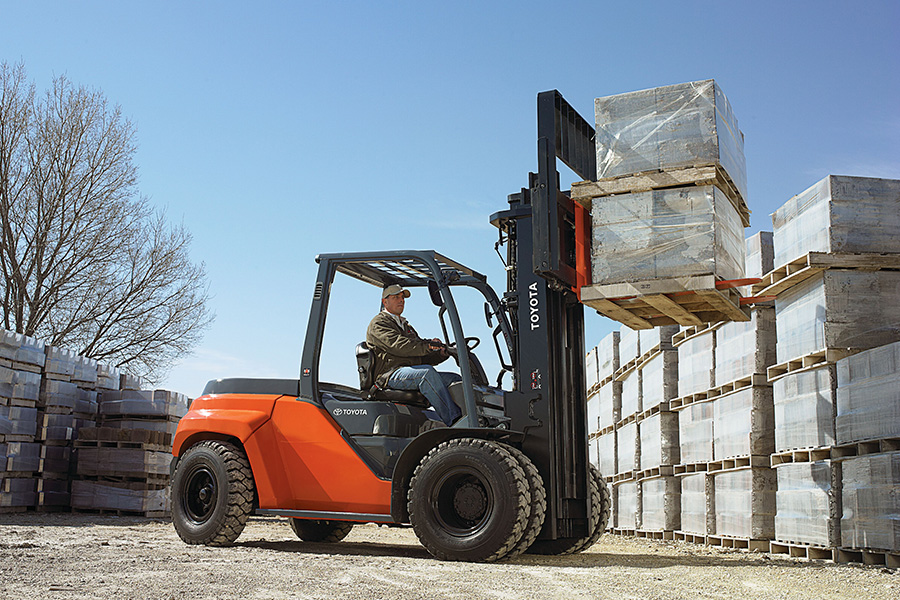
They’re commonly found on construction sites and lumberyards, transporting materials like bricks or lumber across bumpy terrain.
Types of Construction Forklifts
Two of the most important construction forklift types are telehandlers and rough-terrain forklifts.

Telehandler
Short for telescopic handler, looks like a cross between a forklift and a crane. It features an extendable boom arm that can lift loads to great heights or reach over obstacles. Telehandlers are considered an industry staple because they’re so versatile – a typical unit might lift around 5,500 lbs up to 19 feet or more. This makes them ideal for placing pallets of materials on upper floors or positioning trusses and beams on building projects.

Rough-terrain forklift
Often called a straight-mast forklift, resembles a beefed-up traditional forklift. It rides on big, treaded pneumatic tires for traction and usually has a powerful diesel engine. Rough-terrain models excel at hauling heavy loads (several thousand pounds or more) over uneven or sloped ground without losing stability. They’re the go-to choice for jobsites with dirt, gravel, or muddy conditions that would stop an ordinary forklift.
(Notably, some manufacturers have even introduced electric rough-terrain forklifts recently, offering emission-free operation for green building sites.)
Benefits of Renting Over Buying
Opting to rent a forklift instead of buying can deliver significant advantages for construction businesses of all sizes. Here are the key benefits:
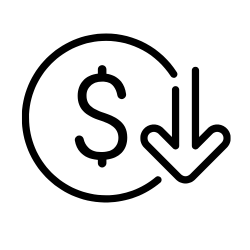
Lower Upfront Cost
Renting avoids the large capital expense of purchasing new equipment (which can easily run $30,000 or more for a standard forklift). There’s no hefty down payment or loan – you simply pay a rental fee for the period you need.

Included Maintenance
Most rental agreements include routine maintenance and repairs for the equipment. The rental provider handles servicing like oil changes, inspections, and replacing worn parts, saving you the cost and hassle of doing it yourself. If the forklift breaks down due to normal use, the rental company fixes it at no extra charge in most cases. (Do note that renters are typically responsible for damage caused by misuse, but all standard upkeep is covered.)

Flexibility and Fleet Management
Renting offers tremendous flexibility for your operations. You can scale your fleet up or down as project demands change – for example, adding an extra telehandler for a busy month, then off-hiring it when the project is done. You’re not locked into one model of forklift, either. Rental contracts are easily exchangeable if you need a different type of forklift as work conditions change.

Access to New Technology
Rental fleets are often stocked with modern, up-to-date equipment. This gives you access to the latest forklift models with advanced features (better fuel efficiency, ergonomics, safety tech) without having to buy them outright. It’s a chance to try newer technology – such as an electric telehandler or hybrid lifts – on your jobsite. If you’re considering investing in such equipment, renting first can serve as a real-world trial.

Better Cash Flow and Utilization
For smaller contractors or those with tight budgets, renting can be more financially manageable. You only pay for the forklift when you actually need it, rather than tying up capital in a machine that might sit idle in the yard for months.
What to Consider Before Renting
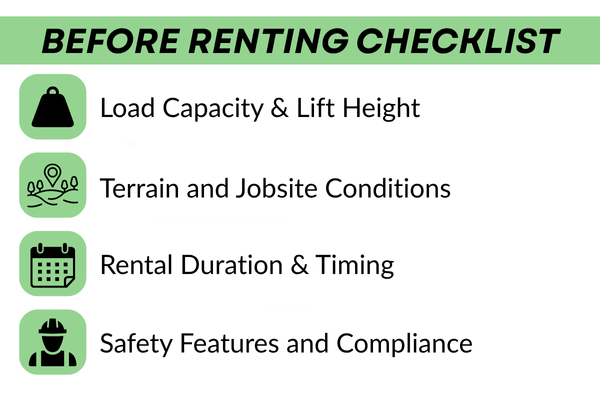
Before you sign a rental agreement, it’s crucial to choose the right forklift for your needs and understand the rental terms. Decision-makers across roles (owner, engineer, safety manager, etc.) should evaluate the following key considerations:
Load Capacity & Lift Height
Determine the maximum weight you’ll need to lift and how high you’ll need to lift it. Always choose a forklift that meets or exceeds these requirements.
Terrain and Jobsite Conditions
Assess where the forklift will be operating. Is it indoors on smooth concrete, outdoors on dirt or gravel, or a bit of both? Terrain drives the type of forklift and tires you need. For predominantly indoor use, a cushion-tire forklift or smaller electric model might be best. For outdoors on uneven or soft ground, you’ll need a rough-terrain model with pneumatic tires and possibly 4WD.
Rental Duration & Timing
Be clear on how long you’ll need the equipment and when. Rental companies offer daily, weekly, and monthly rates – with longer terms often giving better per-day pricing.
Safety Features and Compliance
Safety should be a top priority when selecting any forklift. Verify that the rental unit comes with all required safety features – for example: functional brakes, lights, horn, backup alarm, seat belts, an overhead guard, and ROPS (rollover protection) for rough-terrain models. If you plan to use attachments like a work platform on a telehandler, ensure it has the proper interlocks and fall protection in place.
If you need more information, check out our article on: What to Consider Before Renting a Forklift.
Cost and Factors in Construction Forklift Rentals
Telehandler Rental Cost
| Telehandler Size & Specs | Daily Rate | Weekly Rate | Monthly Rate |
|---|---|---|---|
| Small 5,000 lb capacity, 19 ft reach (compact telehandler) | $478 – 647 | $1,143 – 1,543 | $2,458 – 3,514 |
| Medium 8,000 lb capacity, 42 ft reach (mid-size unit) | $578 – 780 | $1,429 – 1885 | $3,107 – 4,317 |
| Large 10,000+ lb capacity, 55+ ft reach (high reach unit) | $770 – 987 | $1,983 – 2,555 | $4,356 – 5,729 |
Note: These averages were compiled from telehandler rental listings across 10 major U.S. cities, including Milwaukee, Chicago, Minneapolis, Atlanta, Dallas–Fort Worth, Phoenix, Orlando, Los Angeles, Denver, and New York. Prices reflect base equipment rental only and do not include freight, fuel, damage waivers, or other potential fees.
We used a standard deviation method to calculate price ranges, providing a reliable benchmark. Your actual rental cost may vary based on your region, equipment availability, and rental provider.
Learn more about Telehandler Forklift Rentals
Rough Terrain Forklift Rental Cost
| Forklift Capacity | Day | Week | Month |
| 15,000 lb | $617 – 755 | $1,605 – 2,219 | $4,109 – 5,169 |
Note: These averages were compiled from rough terrain listings across 10 major U.S. cities, including Milwaukee, Chicago, Minneapolis, Atlanta, Dallas-Fort Worth, Phoenix, Orlando, Los Angeles, Denver, and New York. Prices reflect base equipment rental only and do not include freight, fuel, damage waivers, or other potential fees.
We used a standard deviation method to calculate price ranges, providing a reliable benchmark. Your actual rental cost may vary based on your region, equipment availability, and rental provider.
Rental rates can vary widely, so it pays to understand what goes into the cost. Generally, the price of a construction forklift rental depends on several factors:
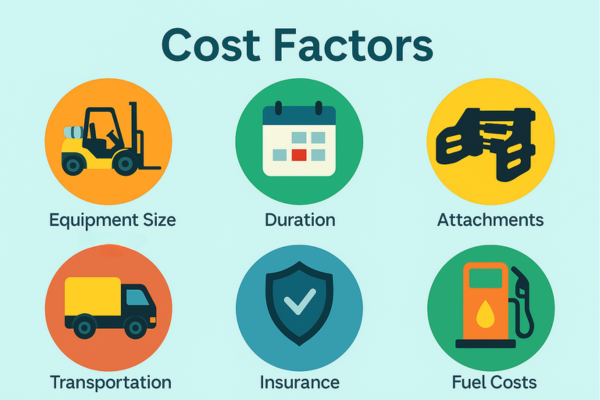
Equipment Size & Type
Larger forklifts or high-capacity telehandlers cost more to rent than smaller units. For example, a 10,000 lb all-terrain forklift will have a higher rate than a 5,000 lb warehouse forklift. Specialized models (like rotatable telehandlers or all-wheel steer units) also come at a premium.
Rental Duration
How long you rent affects the rate. Many suppliers have tiered pricing: daily, weekly, and monthly rates. If you need a forklift for several weeks, it’s usually cheaper to commit to a weekly or monthly term up front, rather than paying day-by-day.
Accessories and Attachments
Rentals often offer optional attachments like fork extensions, bucket attachments, jib cranes, clamps, etc. These typically add an extra fee to your rentalredwaypower.com. If your job could be done faster or safer with a certain attachment, it might be worth the added cost.
Transportation (Delivery/Pickup)
Unless you can transport the forklift yourself, you’ll have a delivery and pickup charge. This cost depends on distance and equipment size (larger machines may require special trailers). Local rentals often have reasonable delivery fees (e.g. perhaps $100–$200 each way), but if your site is far from the rental yard or requires expedited delivery, costs go up.
Insurance and Damage Waivers
Rental companies will require the equipment to be insured. They may ask for proof of your insurance or offer a damage waiver/insurance at an extra daily rate. This protects both parties in case the forklift is damaged or someone is injured.
Fuel or Power Costs
Typically, you receive the machine full of fuel (diesel/propane) and you’re expected to return it full. Fuel is usually not included in rental rates. So budget for the fuel you’ll use. Some rentals will refuel for you at a set price per gallon if you return it less than full.
Every rental provider might structure fees a bit differently. The best practice is to ask for a detailed quote or cost breakdown before you commit. Reputable companies will happily explain their rates, including any deposits, environmental fees, or overtime charges.
Where to Rent Construction Forklifts
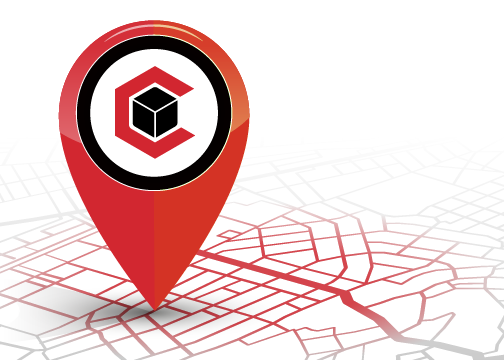
You’ve determined the type of forklift you need – now where should you rent it from? Choosing the right rental partner can impact your overall experience and cost.
Local Construction Forklift Dealers
Working with a local forklift dealer or rental company can offer more personalized service and potentially lower costs. Dealers in your area (for example, Conger Industries in Wisconsin) know the local industries and jobsite conditions well.
They often provide faster service if something goes wrong – since they’re right there in the community, they can quickly dispatch a technician or swap out equipment to keep your project on track. Local rental outfits also build relationships with their customers; you’re more than just an account number. They can suggest the best equipment for your specific project (leveraging their knowledge of the local terrain and common project types).
Additionally, because you’re renting directly, you avoid the middleman markup. Many local dealers pride themselves on competitive pricing and will work with you on rates, especially for longer rentals or repeat business.
A quick web search for “construction forklift rental in [Your City]” or using a business directory can help identify reputable local option. Check reviews or ask colleagues for recommendations. Once you find a good local partner, the personalized support can be a huge asset.
(If you’re in Wisconsin or the UP, Conger Industries’ forklift rentals are a local option that offers a wide range of equipment backed by in-house service teams. We have offices in Green Bay, Neenah, and Wausau).
Final Thoughts
Choosing a construction forklift rental can significantly enhance efficiency, flexibility, and cost-effectiveness on your jobsite. By carefully assessing your project’s needs, understanding rental costs, and partnering with a reputable local dealer, you can ensure smooth operations and optimal productivity.
Renting provides access to advanced equipment technology, lowers upfront expenses, and offers unmatched flexibility—allowing you to adapt quickly to changing project requirements. With the right forklift rental solution, you’ll keep your projects moving forward safely, efficiently, and within budget.
